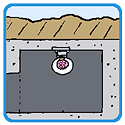|
EvanSchenck posted:The Soviets also would have been interested, though their contribution is a little questionable considering how bad their army was at the time and the difficulty of getting forces to the theater of war, since they had no land access. Supposedly Stalin suggested that the Red Army could transit through Romania and Poland to help out the Czechs - whether Romania and Poland agreed or not. One suspects that Britain and France did not view this proposal with excitement - bearing mind that Stalin had literally murdered millions of his own people, and Hitler had merely expressed the intention to maybe do so at some point in the future.
|
|
|
|

|
| # ? Apr 28, 2024 09:08 |
|
Zorak of Michigan posted:A Japanese invasion of Hawaii would have been a blunder of astonishing proportions. It would effectively bring the war closer to US shipyards, require long supply lines that the Japanese would have enormous difficulty supporting, and possibly tilt US policy toward dealing with Japan first. Well, being closer to the shipyards wouldn't matter much, since fighting over the distance between Hawaii and the West Coast would make American logistics a nightmare too. That would in a case where Pearl Harbor is effectively neutralized, also have the effect that any Japanese advance south and west of Hawaii would be hard to counter, leaving Australia more isolated since the lines of communication and supply to the US would be cut off and only the eastern lines would remain open.
|
|
|
|
Kemper Boyd posted:Well, being closer to the shipyards wouldn't matter much, since fighting over the distance between Hawaii and the West Coast would make American logistics a nightmare too. The events of the war demonstrated that the US could manage fighting at the end of a long logistical tail much better than the Japanese could. I had the impression that while Hawaii made an excellent forward supply depot, most of the actual construction happened on the west coast anyway. Moving the fight to Hawaii seems like a net logistical win for the US when compared to having all of Pearl's logistics bombed out but still having to fight in the mid and south Pacific. I feel somewhat the same way about the idea of a Japanese invasion of Australia. It obviously would have absolutely sucked for the Australians, but the Japanese Army would have taken awful losses and been that much more exposed to enemy firepower. They were somewhat overextended at their actual historical peak, so any change in the war that leaves them invading any more territory ends up being worse for them.
|
|
|
|
The biggest impact from losing Hawaii as a base would have been the loss of the submarine bases. For most of the first two years of the Pacific war American subs were the most effective fighting force we had, and most of their sorties came out of Pearl. Had we been forced to use only Australia and the west coast as our sub bases, there would have been a HUGE impact on the overall effectiveness of our sub forces, which would have in turn had a huge impact on how effective the Japanese supply lines were. Any assumptions that we make on Japanese efficiency has to be taken in this light...having an extra 100k tons of shipping a month available to them would have made a big difference.
|
|
|
|
bewbies posted:The biggest impact from losing Hawaii as a base would have been the loss of the submarine bases. For most of the first two years of the Pacific war American subs were the most effective fighting force we had, and most of their sorties came out of Pearl. Had we been forced to use only Australia and the west coast as our sub bases, there would have been a HUGE impact on the overall effectiveness of our sub forces, which would have in turn had a huge impact on how effective the Japanese supply lines were. Any assumptions that we make on Japanese efficiency has to be taken in this light...having an extra 100k tons of shipping a month available to them would have made a big difference. I thought our torpedoes were crap and the sub force rendered much less efficient until 1943. Did I get it wrong? In any case the sub facilities would be a big loss in the case where the Japanese make air attacks to finish off Pearl Harbor but then pull back. If they invaded Pearl Harbor, then our subs would only need to be able to patrol out past Hawaii to interdict supplies and reinforcements from the home islands. Subs based on the west coast could patrol effectively at that distance.
|
|
|
|
Zorak of Michigan posted:I thought our torpedoes were crap and the sub force rendered much less efficient until 1943. Did I get it wrong? No you're right, but even with the lovely torpedoes the US sank around 20% of the total Japanese merchant fleet in 1942, this around twice the rate they were being replaced. This number doubled in 1943 as the problems with the Mk14 got ironed out. quote:In any case the sub facilities would be a big loss in the case where the Japanese make air attacks to finish off Pearl Harbor but then pull back. If they invaded Pearl Harbor, then our subs would only need to be able to patrol out past Hawaii to interdict supplies and reinforcements from the home islands. Subs based on the west coast could patrol effectively at that distance. That would have only taken care of the supply lines to Hawaii, which was only a tiny part of the total Japanese supply system, and even then it would not have been an ideal tactical situation as the sea is so wide open around Hawaii. The biggest impact would have stemmed from our inability to hunt in and around the Phillippines, particularly the Strait of Luzon, where we were able to very successfully interdict supply flow coming from the East Indies going back to the home islands. US subs sunk gobs of Japanese shipping here and it would have been all but impossible to do this if Hawaii had been lost.
|
|
|
|
bewbies posted:The biggest impact would have stemmed from our inability to hunt in and around the Phillippines, particularly the Strait of Luzon, where we were able to very successfully interdict supply flow coming from the East Indies going back to the home islands. US subs sunk gobs of Japanese shipping here and it would have been all but impossible to do this if Hawaii had been lost. You don't think they would have built up Darwin or Perth or even Celyon as a sub base? Yes the logistical tail would have been much longer to the base, but those are all closer to the East Indies than Pearl.
|
|
|
|
wins32767 posted:You don't think they would have built up Darwin or Perth or even Celyon as a sub base? Yes the logistical tail would have been much longer to the base, but those are all closer to the East Indies than Pearl. That supply line would have been more than just long, it would have been horrifically vulnerable. To the west, they would have sailing through 8000 miles of Japanese controlled waters with Hawaii right in the middle. To the east, they're sailing 20,000+ miles, through the Atlantic U-boat hunting waters, and then again through the Japanese controlled waters south of Sumatra to get to Australia. Neither option would have been very effective; in fact, this is why we didn't base more subs out of Australia even though it was far closer to the Japanese merchant lanes than was Pearl or Midway. Alternatively I suppose they could have tried to set up arms and parts manufacturing in Australia, but that would have taken years to gear up.
|
|
|
|
bewbies posted:That supply line would have been more than just long, it would have been horrifically vulnerable. To the west, they would have sailing through 8000 miles of Japanese controlled waters with Hawaii right in the middle. To the east, they're sailing 20,000+ miles, through the Atlantic U-boat hunting waters, and then again through the Japanese controlled waters south of Sumatra to get to Australia. Neither option would have been very effective; in fact, this is why we didn't base more subs out of Australia even though it was far closer to the Japanese merchant lanes than was Pearl or Midway. Alternatively I suppose they could have tried to set up arms and parts manufacturing in Australia, but that would have taken years to gear up. Australia is well south of the Japanese perimeter, even if it includes Hawaii. Just send them down the cost of South America and then across in the roaring 40s. It would certainly increase the fuel requirements and the transit time but given that the British Far East fleet based out of Ceylon (at the end of a horrifically vulnerable supply line) I don't think that it's out of the question. Certainly it made a lot more sense for the US to base the subs out of Hawaii in the real war, but in this counter-factual I'm not sure the US would just give up on it's attempts to interdict the Japanese oil supply which was so important to their Navy.
|
|
|
|
wins32767 posted:Australia is well south of the Japanese perimeter, even if it includes Hawaii. Just send them down the cost of South America and then across in the roaring 40s. It would certainly increase the fuel requirements and the transit time but given that the British Far East fleet based out of Ceylon (at the end of a horrifically vulnerable supply line) I don't think that it's out of the question. Certainly it made a lot more sense for the US to base the subs out of Hawaii in the real war, but in this counter-factual I'm not sure the US would just give up on it's attempts to interdict the Japanese oil supply which was so important to their Navy. I didn't say the US would have given up the sub campaign, just that it would have been a lot less effective which would have been a very, very bad thing. Also, let's remember that the Eastern Fleet was not exactly the most effective fighting force of the war.
|
|
|
|
Trouble Man posted:Supposedly Stalin suggested that the Red Army could transit through Romania and Poland to help out the Czechs - whether Romania and Poland agreed or not. I didn't know that, but it sounds like a terrible idea that would have failed miserably. quote:One suspects that Britain and France did not view this proposal with excitement - bearing mind that Stalin had literally murdered millions of his own people, Stalin only murdered that many in the same sense that Mao did, in that it wasn't on purpose and he just made stupid decisions that got that many people killed by famine. To be totally fair to one of histories greatest monsters, he probably murdered (that is, shot or threw into prison camps designed to kill the prisoners) a high-end estimate of a million people, more likely somewhere in the high hundreds of thousands. Not that it really makes it better. Anyway, most of the world (including the majority of Soviet citizens) had only a very limited sense of what was happening in the USSR, most of which came from its press releases. Thanks to the Comintern, contacts with sympathetic leftists throughout the West, and their own fairly efficient spies, the Soviets had a much better idea of what was going on outside their borders than anybody else had about what was going on inside the USSR.* The Allies knew the vaguest outlines. For example, all they knew about the Great Purge of 36-38 was what Stalin actually publicized--they thought it was only a few hundred or thousand more-or-less important officials who got purged, as opposed to hundreds of thousands of ordinary people. They also knew that there was some kind of famine in the early '30s, but as for how many people actually died, that was a big question mark. The West actually found out about the appalling extent of Stalinist brutality at about the same time most Soviet citizens did, during Khruschev's deStalinization in the 1950s. Western antipathy towards the Soviet Union was more based on two things. First, the Soviets had killed or exiled all the Tsarist aristocrats and seized their property. The British and American governments, which were basically run by property-owning aristocrats (literally so in the British case), naturally didn't like that. This is possibly why France, which had no real aristocratic class, was the best disposed of the allies towards the Soviets. Second, they thought that Stalin still wanted to export Communist revolution. This is in part an artifact of the above point about how little they knew what was happening in the USSR. The triumph of Stalin represented a shift in Soviet policy towards internal development, and the abandonment of plans to incite Communist revolution in other countries, but everybody remained suspicious of them. Subsidiary reasons to hate the Soviets were that everybody at least knew about the Red Terror during the Russian Civil War, and they knew that the Comintern was a massive intelligence-gathering operation that had infiltrated their countries. Neither of which made them friendly towards the Soviets. quote:and Hitler had merely expressed the intention to maybe do so at some point in the future. The ironic thing about this is that Stalin was the only world leader to take Hitler's stated aims seriously, maybe because he knew they had something in common. *The outstanding example of this lack of good intelligence is that when the Germans invaded, they had only a hazy idea of how large the Red Army was, and not even the vaguest concept of Soviet mobilization capacity. The Germans destroyed what they believed was the entire Red Army in the first two months or so of the invasion, then again during the push towards Stalingrad in 1942, but the Soviets kept pulling new divisions out of nowhere, like a cheating AI opponent in an RTS.
|
|
|
|
bewbies posted:I didn't say the US would have given up the sub campaign, just that it would have been a lot less effective which would have been a very, very bad thing. Also, let's remember that the Eastern Fleet was not exactly the most effective fighting force of the war. Doctrine and equipment have a lot to do with that though. I certainly agree that they couldn't have supported the same number of subs from Perth that they did from Pearl but I think the numbers would have been much increased over the historical rate.
|
|
|
|
EvanSchenck posted:
That is pretty drat funny.
|
|
|
|
With all this US sub talk I have a couple of questions: Why did the US sub forces seem to have way less loses than the German U-Boats. Was it from the Germans basically concentrating on the North Atlantic and the Allies being able to defend smaller shipping lanes than the Japanese? Did the Germans sink more or less % of shipping? Also, that cheating AI comment made me laugh loudly at work and everyone stared.
|
|
|
|
KurdtLives posted:With all this US sub talk I have a couple of questions: Why did the US sub forces seem to have way less loses than the German U-Boats. Was it from the Germans basically concentrating on the North Atlantic and the Allies being able to defend smaller shipping lanes than the Japanese? Did the Germans sink more or less % of shipping? The Japanese sucked at anti-sub warfare while the allies took it very seriously and quickly improved their equipment and doctrines to counter the threat.
|
|
|
|
lilljonas posted:The Japanese sucked at anti-sub warfare while the allies took it very seriously and quickly improved their equipment and doctrines to counter the threat. That and Japan had an inordinate amount of merchant shipping for a nation of its ability to provide escorts. It's not really possible that they could have used a convoy system due to their lack of suitable escort ships. They also lagged behind in the ASW advances that made the Atlantic a bloodbath for U-boats starting in 1943. You have to keep in mind that Japan's industrial base was comparable with Italy's, and they really did fight the war on a shoestring like that.
|
|
|
|
EvanSchenck posted:*The outstanding example of this lack of good intelligence is that when the Germans invaded, they had only a hazy idea of how large the Red Army was, and not even the vaguest concept of Soviet mobilization capacity. The Germans destroyed what they believed was the entire Red Army in the first two months or so of the invasion, then again during the push towards Stalingrad in 1942, but the Soviets kept pulling new divisions out of nowhere, like a cheating AI opponent in an RTS. Quite literally the Soviets suffered as many losses in the first six weeks as they had men under arms at the start of the war. You're quite right that the Soviets rebuilt their entire army but the new formations were a lot worse in quality.
|
|
|
|
A question. I've done a fair amount of reading about the proposed invasion of Japan during World War II. During Operation CORONET, the First Army was to play a prominent role. My question is this: why the First Army? Hodges was a mediocre general, and the First Army staff was notoriously sloppy (see the Battle of the Ardennes); what, then, caused the First Army to be earmarked over say, the Seventh Army?
|
|
|
|
wins32767 posted:Quite literally the Soviets suffered as many losses in the first six weeks as they had men under arms at the start of the war. You're quite right that the Soviets rebuilt their entire army but the new formations were a lot worse in quality. To outright say that they were 'worse' in quality is misleading. The Soviet Rifle division after 1941 was a lot different, but more because it was simplified and stripped of many of the divisional assets, as divisional commanders were in short supply. This is why the all-arms rifle divisions performed really poorly in 1941; the divisional commanders were so overwhelmed that they literally deployed their battalions how the manual described without regard to the terrain. Everything about the Soviet army was stripped down to try and save on officers, and was only gradually re-formed. As the units were tightened up(ponderous mechanized corps replaced by independent tank brigades, etc.), they performed a lot better. The period between 1937 and 1941 was the nadir of the Soviet army, and they were still recovering from the tenure of the inept Kliment Voroshilov(the 'KV' in the KV-1).
|
|
|
|
Where do I find a good introduction -- preferably a book - to military tactics and strategy? Either small squad or large-scale. Every single military historian, and even most science-fiction writers, casually toss around pincers and envelopment and echelons like they've been able to study the theory. WHERE?
|
|
|
|
Panzeh posted:To outright say that they were 'worse' in quality is misleading. The Soviet Rifle division after 1941 was a lot different, but more because it was simplified and stripped of many of the divisional assets, as divisional commanders were in short supply. This is why the all-arms rifle divisions performed really poorly in 1941; the divisional commanders were so overwhelmed that they literally deployed their battalions how the manual described without regard to the terrain. Everything about the Soviet army was stripped down to try and save on officers, and was only gradually re-formed. quote:As the units were tightened up(ponderous mechanized corps replaced by independent tank brigades, etc.), they performed a lot better.
|
|
|
|
Copernic posted:Where do I find a good introduction -- preferably a book - to military tactics and strategy? Either small squad or large-scale. My favourie source of "military history for dummies" is Osprey Publishing. Most of their titles focus on a specific period and army, but will give a very simple description of things. While they won't cover very general terms like what a pincer move it, they cover broad topics like how US paratrooper forces were used in WW2, or how cavalry was used by Alexander the Great, or how samurai armies fought. And they are all very easy to get into as they are written as popular history books and not academic books. This means that they are not always the most accurate sources when it comes to details, but if your library has any I'd check them out if you want to learn more about a specific army without picking up a brick sized book. And they have tons of glossy pictures for everyone who lack the willpower to slug through text. e: going to their home page and searching on strategy or tactics will give you a ton of books http://www.ospreypublishing.com/ lilljonas fucked around with this message at 19:47 on Sep 23, 2010 |
|
|
|
Also the US Army Field Manuals are available online. They're mostly from the Cold-War era, and they have good info on infantry and armor tactics.
|
|
|
|
Copernic posted:Where do I find a good introduction -- preferably a book - to military tactics and strategy? Either small squad or large-scale. I don't know how reputable this is but I thought it was pretty neat: http://www.amazon.com/Art-War-Western-World/dp/0252069668/ref=sr_1_1?s=gateway&ie=UTF8&qid=1285288482&sr=8-1 Granted I read it a number of years ago so my memory may be tricking me.
|
|
|
|
EvanSchenck posted:*The outstanding example of this lack of good intelligence is that when the Germans invaded, they had only a hazy idea of how large the Red Army was, and not even the vaguest concept of Soviet mobilization capacity. The Germans destroyed what they believed was the entire Red Army in the first two months or so of the invasion, then again during the push towards Stalingrad in 1942, but the Soviets kept pulling new divisions out of nowhere, like a cheating AI opponent in an RTS. There's a probably apocryphal tale of a Barbarossa wargame at Sandhurst in which both the Axis and Soviet teams complained the game was unrealistically rigged - the Soviets couldn't stop the Germans blasting through every defence line they set up, and the Germans could destroy dozens of divisions with no apparent impact on the size of the Red Army.
|
|
|
|
Trouble Man posted:There's a probably apocryphal tale of a Barbarossa wargame at Sandhurst in which both the Axis and Soviet teams complained the game was unrealistically rigged - the Soviets couldn't stop the Germans blasting through every defence line they set up, and the Germans could destroy dozens of divisions with no apparent impact on the size of the Red Army. There's a similar story about US Navy wargamers being unable to replicate the Battle of Midway, because the historical course of the battle was too improbable. I file this kind of anecdote under "interesting if true." wins32767 posted:Quite literally the Soviets suffered as many losses in the first six weeks as they had men under arms at the start of the war. You're quite right that the Soviets rebuilt their entire army but the new formations were a lot worse in quality. In one of Glantz's books (I think it was When Titans Clashed) he shows that at any given time after Barbarossa the average Soviet division was at only half its paper strength, and these shortfalls were disproportionately in the area of mobile formations and heavy equipment. These deficiencies are probably best shown by the fact that even during successful operations the Soviets often suffered extreme casualties, and until late 1943 they generally lacked staying power (for example the failure of the Kharkov Offensive following Stalingrad).
|
|
|
|
EvanSchenck posted:There's a similar story about US Navy wargamers being unable to replicate the Battle of Midway, because the historical course of the battle was too improbable. I file this kind of anecdote under "interesting if true." Can you expand on this? It seems weird that you can't replicate something that actually took place.
|
|
|
|
What were the Germans using to shell the beach during DDay?
|
|
|
|
Boiled Water posted:Can you expand on this? It seems weird that you can't replicate something that actually took place. I think he's implying the odds of the historical events actually happening are so slim it's hard to recreate the same outcome. I'd guess in the simulations, the "American" units were blasted apart instead of vice versa.
|
|
|
|
So the Red Army is the largest army that has ever existed, right? I'm guessing the current U.S. Army is the most powerful one in history, but in relation to it's time, what military takes the cake? The Romans? The Mongols?
|
|
|
|
That's odd, I thought China had the largest army.
|
|
|
|
Tetrix posted:What were the Germans using to shell the beach during DDay? Pretty much everything imaginable. Fortified batteries on the coast held mortars and gun emplacements ranging from 50mm mortars to 150mm gun turrets taken off of warships. Behind the beaches there were all manner of indirect fire platforms, most were probably one of the three varieties of 150mm howitzer or lighter 105mm emplacements. Behind that, there were super heavy (210mm) guns as well as rocket launchers.
|
|
|
|
They also used 88's against the landing craft.
|
|
|
|
Captured guns of various caliber were a fairly important part of the Atlantic Wall, such as the ex-French Army Canon de 155mm GPF (the guns that the Rangers were supposed to find & destroy at Pointe du Hoc on D-Day were of this type), and the ex-Soviet Army 122 mm howitzer M1938 (M-30).
|
|
|
|
Vino posted:That's odd, I thought China had the largest army. In WWII the Red Army had what, twelve million people fighting on it? And I think throughout the Cold War it had anywhere between 4 to 5 million people. People's Liberation Army has around two million people in it's standing army, I think. Another 1 million in reserve. I'm not sure how many people they would successfully mobilize in a total war situation.
|
|
|
|
I read somewhere that the Chinese police force and paramilitaries are counted as part their army strength though
|
|
|
|
Boiled Water posted:Can you expand on this? It seems weird that you can't replicate something that actually took place. I'm no expert on the exact events, but basically the US won at Midway because a fighter squadron got lost and happened upon three of the Japanese carriers as they sat helpless while refueling and rearming their planes.
|
|
|
|
DarkCrawler posted:So the Red Army is the largest army that has ever existed, right? I'm guessing the current U.S. Army is the most powerful one in history, but in relation to it's time, what military takes the cake? The Romans? The Mongols? I think the Red Army at the end of WWII. However, until the advent of firearms, the Mongols/Turks/Tatars were perhaps the most feared troops in the world. The Huns, Avars, Cumans, Mongols, etc. swept through Asia and Europe whenever they could be united.
|
|
|
|
Mr. Sunshine posted:I'm no expert on the exact events, but basically the US won at Midway because a fighter squadron got lost and happened upon three of the Japanese carriers as they sat helpless while refueling and rearming their planes. This. Midway was a crushing US victory because the USN was lucky with its spotting, and got the drop on the Japanese. This was a chance occurrence, so whereas wargamers could simulate their way to a US victory, it doesn't really turn out just the way it occurred historically. DarkCrawler posted:So the Red Army is the largest army that has ever existed, right? I'm guessing the current U.S. Army is the most powerful one in history, Are we talking about national military machines as a whole, or just armies? Because the US Army is extremely well organized and integrated in it's command, control, and intelligence structures, but it is rather small. The principal advantage of the American military is in its support arms, the Navy and Air Force, which can disrupt enemy forces to the point that they're only marginally capable of resistance. If I had to pick the most overwhelmingly powerful military force that ever existed, I would probably look at the US Navy, which is 3-4 times as powerful as all the other navies in the world combined. The US Navy could easily destroy any enemy or combination of enemies at sea. In most cases it could then use it's carriers in cooperation with the USAF to destroy the ability of those enemies to continue fighting. There are a few countries that could make an air offensive too expensive to contemplate (modern war planes are unbelievably expensive, so losing even a few is a blow), but most of our likely foes couldn't. The US military is something like a much more dangerous refinement of the 19th century British model, in that it's a small professional force backed by a practically invincible navy and air force for power-projection. The combination of all this is probably overall the most relatively unstoppable military force in history. In a sense the US Army is actually the limiting factor in American military power, because of its small size. For example, the US military could devastate the Iranian military and civilian infrastructure and contain them as a threat if a war ever occurred, but the army is probably too small to effectively take control of a country that size (we barely controlled Iraq, which is 1/3 as large and half as populous). Schenck v. U.S. fucked around with this message at 00:21 on Sep 28, 2010 |
|
|
|

|
| # ? Apr 28, 2024 09:08 |
|
Forgetting the "History" part of the thread I thought we were talking about modern day militaries, of which China is the largest. But end of WWII that's wrong and I will go back to lurking now.
|
|
|
























